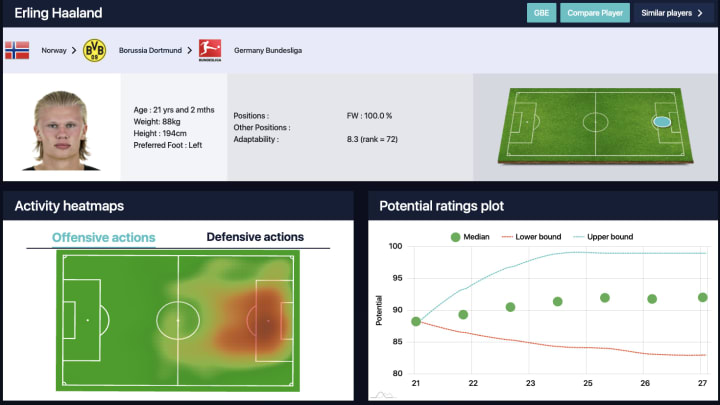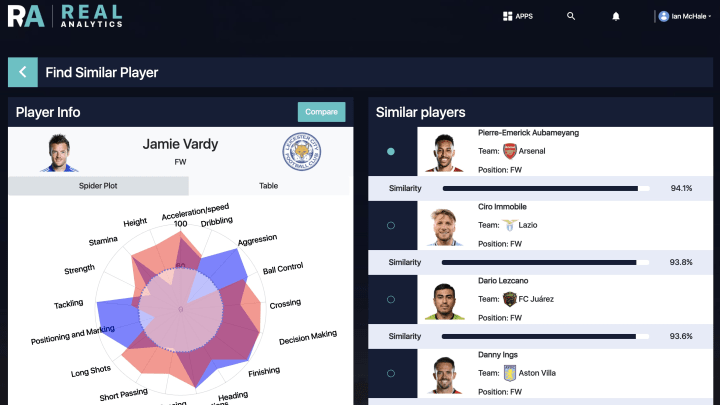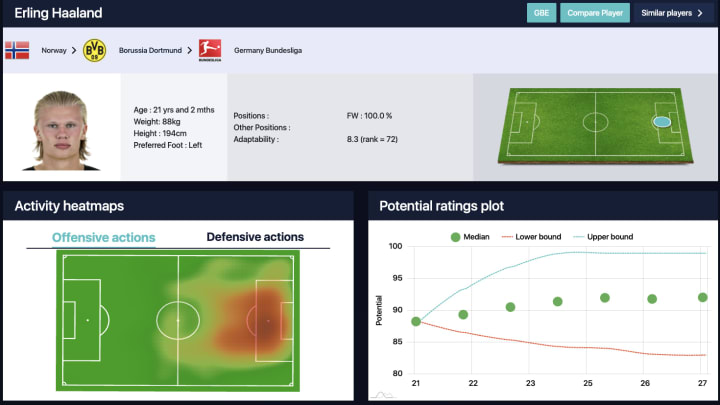
Real Analytics – the real life Moneyball revolutionising football recruitment
Moneyball is a term that comes from a movie and book about baseball, and basically how stats and analytics could be used to gain a competitive advantage.
And indeed, the premise of the hit Hollywood movie, starring Brad Pitt, was that using mathematical systems could produce a winning team both on paper and then subsequently on the field.
Many would, and do, argue that this is only possible in games such as baseball which can be broken down in terms of stats easier than others.
Football is one of those sports that nobody ever thought it was possible – but that really is not the case.
Yes, we are talking analytics, but not just any analytics – this is Real Analytics, the self-professed future of decision making in football.
Professor Ian McHale and Dr Tarak Kharrat are the duo that founded a company that looks at forecasts for football, but more recently that has led them into the field of football recruitment.
So, the comparisons to Moneyball are logical and Real Analytics themselves have few qualms about the links – indeed they have encouraged them.
„Moneyball has been a big help, it has raised the profile for what we can do“
– Professor Ian McHale
“Moneyball has been a big help, it has raised the profile for what we can do, it has been useful,” McHale tells 90min.
Like with the baseball formula used in Moneyball, Real Analytics can and do use their forecasts to simply tell a team if they should sign a player, as they can tell them how many more points they could achieve in the forthcoming season with that player in their team.
“We can predict, for instance the difference between Manchester United signing Erling Haaland and Robert Lewandowski – who would be the most likely to give them more points, who would they be most successful with,” McHale explains.
“We can see the expected league position under either scenario and make a judgement as to which signing (or neither) is likely to be best for the club.”

Real Analytics has been working with Premier League clubs since they were founded in 2018. Their results have been impressive and the client base is growing all the time. Premier League clubs fully believe and trust in the results, that is clear.
So where did it all start for these two mathematicians? With no background in football, other than a love for the game.
McHale reveals: “I met Tarak at the University of Manchester, School of Mathematics when he was finishing his PhD. We initially worked on building forecasting models for the results of football matches and went down the avenue of helping betting syndicates and betting operators. Our ethos was to rate players, not teams, to drive our forecasts and make predictions based on the actual 22 players on the pitch.
“Then one rainy Friday afternoon we were sat in the office and Tarak said to me: ‘You know we can use this model to help clubs with their recruitment of players?’ This was allied with the mantra of: it doesn’t matter what a player has done in the past; what matters is what he does in the future. That is what is relevant to recruitment – not what a player has done but what he can do in the future.”
It soon became apparent to the duo that their skills could help forge a suite of tools to be used in football recruitment.
“We started speaking to some clubs and realised the tools we were building were of use, and value,” Kharrat says.

“Over a few years we have gradually built up the operation where we now have a suite of tools – ranging from advanced analytics, to rating players performance and predicting how good they will be, and event and tracking data generation. We can then rate how a signing of a player can predict the performance.”
The whole system emerged from the initial premise of helping predict games, which is obviously somewhat useful when it comes to betting on the game, and those facilities are still being used.
“The forecasting models to help betting syndicates were and are based on players, and once you know starting XI for each team you can simulate and predict the results of any match,“ McHale continues.
“So for example if you have a match such as Manchester United v West Brom, you could say from the outset Man Utd are very good, West Brom are okay – so we can predict a United win. But if you get extra info like Paul Pogba being injured, maybe Marcus Rashford also injured, then that can make a difference to the probabilities of the various outcomes.
„We can calculate the difference by dropping both of those players from our forecasting model and see the difference it makes to the predicted result. We can also add players in – like Cristiano Ronaldo for instance – and we don’t have to restrict it to one match. We can do whole season, but not just once – a million times. We can then take a step back and look at where, on average, over the one million simulations United will finish.

“We can predict the impact that Lukaku will have on Chelsea this season – but we will also predict how often he will play, based on his injury record. You might find that Lukaku adds three points over the season and provides a 3% increase on the probability of winning the league.
“As forecasts go, our forecasts are industry leading, but nothing is perfect, that is for sure. There is always going to be noise in football results, that is what makes the game interesting.”
Kharrat adds that they have a strong record of forecasting accuracy.
“You can see historically our predictions are good. We use data from several sources, and from that we create our own feed. Things like injury history, red and yellow cards, all sorts of things like that impact on our results.”
The duo believes their system helps clubs, and therefore fans. They want to stop money being wasted on unsuccessful transfers, where there are risks being taken that don’t need to be.
“As football fans, it is rewarding – you speak to some clubs who are spending millions without much due diligence,” McHale notes.
„?? ???? ???????????? ??????? ??????, ??? ??????? ?? ???? ? ??? ???? ?? ?????.”
Lee Dykes spoke to 90min about life as Brentford’s director of recruitment and the club’s promotion to the top flight. ?
— 90min (@90min_Football) July 19, 2021
“We want football clubs to stop making bad decisions. Some industries do so much more due diligence. At a university for example, you will do rounds and rounds of interviews, but when it comes to football that doesn’t (and can’t) happen. So you have to do something extra – like analytics – to minimise the chances of recruiting a dud.
“In our experience some clubs underestimate what it takes to build an efficient analytics team. It takes years of research to make the data work – some think they can do it over a summer through an intern.
“Some industries employ the top graduates and have teams of 20 in their data science group. Football isn’t there yet, but it is coming.”
Real Analytics has become a hugely valuable tool, and it is clear that although you may not have heard of Real Analytics, they are already playing a major part in Premier League decision making. But that is only the beginning.
“Clubs are saying to us that they don’t want people to know they are using us, which is ok with us, but we are now advising teams in the MLS, Bundesliga and Serie A – so things are going well.”